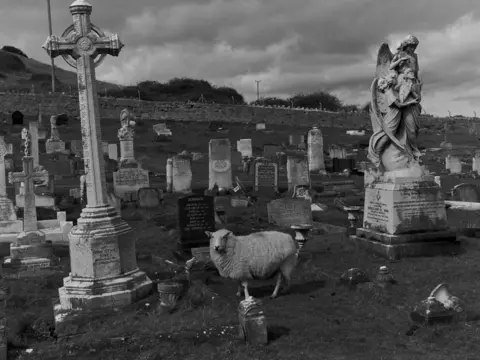 Mohamed Hassan
Mohamed HassanWhen Mohamed Hassan arrived in Wales 15 years ago, he spoke very little English and worked in a series of low-paid jobs where he endured discrimination.
Today he is a regular artist with his latest exhibition on display at the Welsh Parliament.
He credits the Welsh community for fostering his creativity and helping him get out of his own mind after arriving in the country.
“Photography helped keep me calm,” he said.
“I was scared, I felt like I wanted to go back because everything was strange around me… but it was so beautiful, I felt like I was dreaming.
“I have never seen a blue or green sky, because in Egypt it is dusty, noisy and different.”
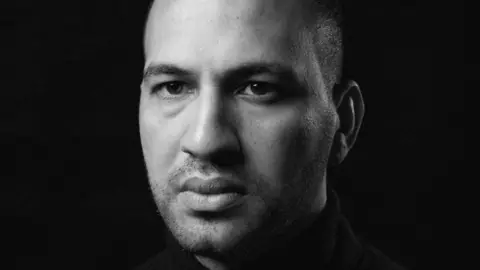 Ahmed Taha
Ahmed TahaMohamed was born in Egypt’s second largest city, Alexandria, where he earned a degree in oil and gas engineering before meeting his half-Welsh wife at work.
The family decided to move to Laugharne in Carmarthenshire to be closer to his mother, before moving again to Milford Haven in Pembrokeshire.
“I worked at McDonald’s, I worked at Lidl, but I was always interested in art and painting,” Mohamed said.
During this time he had “a lot of problems” working with customers and was often ridiculed by people.
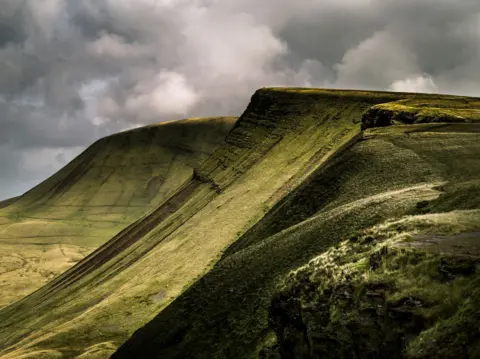 Mohamed Hassan
Mohamed Hassan“I faced a lot of discrimination in the beginning and that’s why my English was not good, because I was afraid to talk to people,” he said.
“I had really bad anxiety so I started painting places and people. I was happy to walk for miles, I just felt better when I was working.”
At first Mohamed used a smartphone to take pictures.
People told him he had a good eye which encouraged him to start a weekly photography class at Pembrokeshire College.
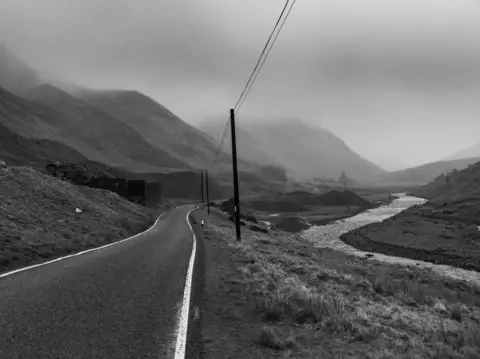 Mohamed Hassan
Mohamed Hassan“I bought my first camera and six months later I had a small exhibition in a small house in Milford Haven,” he said.
In 2014 he went to Carmarthen School of Art to study painting.
“Since that time, I have not stopped working,” he said.
It was a difficult meeting with David Hurn, the man often described as the most famous artist in Wales, that inspired his work.
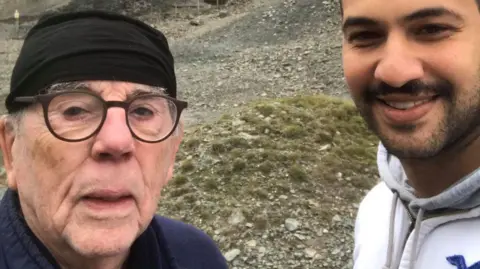 Mohamed Hassan
Mohamed HassanOver the past seventy years, Hurn, now 90, has written everything from the Aberfan tragedy to the Beatles At the height of Beatlemania and in the 70s he established the prestigious Newport School of Documentary Photography, producing many photographers.
“I told him I was a fan and he asked me where I was from and what kind of pictures I make,” Mohamed said.
“He was so nice and inspired me so much that something clicked – that day I changed my camera to black and white and learned a new skill.”
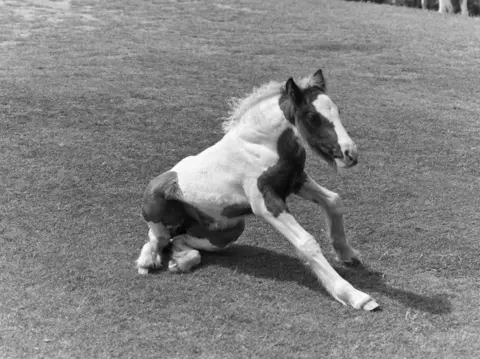 Mohamed Hassan
Mohamed HassanMohamed started buying Hurn’s photo books and decided to take more of his photos around Wales.
“I started going to North Wales a lot and you get in the car and it’s raining or raining, so I start working and take pictures inside the car, like behind the window so it’s like a dream. Look,” he said.
He was also inspired by David Company’s book The Open Road: Photography & The American Road Trip.
“I thought maybe I could do that in Wales, get in the car and just take pictures and let the pictures lead me to the next picture, like a story or a poem.”
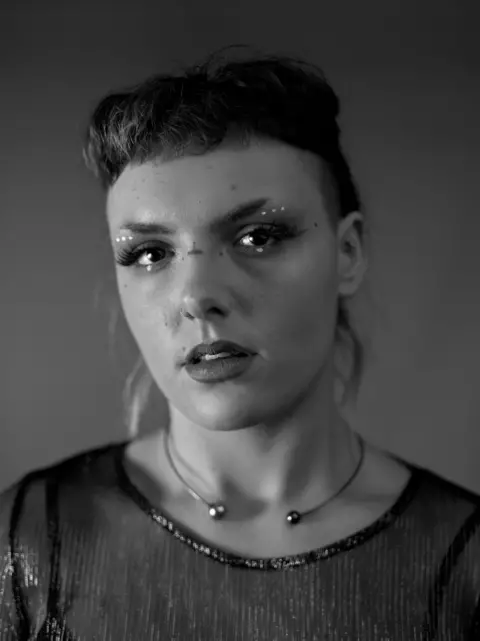 Mohamed Hassan
Mohamed HassanTaking pictures was not easy.
“I was very scared to take pictures of people because I didn’t have confidence, the language was difficult,” said Mohamed.
His teacher encouraged him to persevere.
He found that he naturally gravitated towards other people who had just arrived in Wales or who were marginalized by their culture or class.
He attributes this to his experiences while in Wales.
“Older people used to ask me questions like, ‘What made you come here?’ It just sounds like a lot of questions, and I used to answer all those questions but now I’m in denial,” he said.
“Maybe that’s why I take pictures of people who are like me or don’t have a lot of words.”
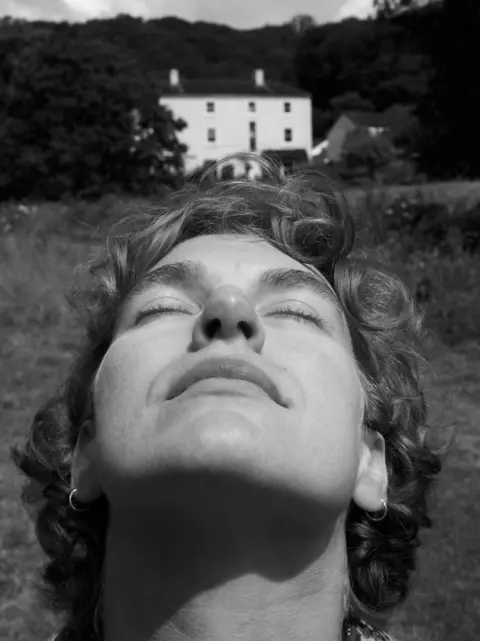 Mohamed Hassan
Mohamed HassanHe said his career began to unravel after he sent about 15 emails to Wales with samples of his photos.
“Within a week or two I had six shows,” he said.
Last year he was commissioned by the Government Art Collection to photograph Welsh celebrations on the day of the establishment of King Charles.
Currently, his exhibition Evidence in Wales, a long-term study of local and national communities created through a series of trips across the country, is at the Welsh Parliament’s Pierhead Futures Gallery until 2 November.
Next month The Changemakers Project will be touring Wales.
For the show he photographed Welsh leaders from non-representative groups, including the first minister of Wales Vaughan Gethingand these photos will be displayed along with other photos taken by the late Kenyan photographer Mohamed Amin.
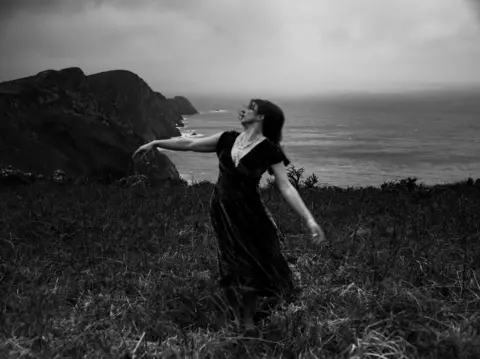 Mohamed Hassan
Mohamed HassanSuccess is not something Mohamed takes lightly.
“Sometimes I say ‘how did that happen?’ because four years ago I used to do this as a habit,” he said.
Today he works as a freelance artist, earning money by selling his work and teaching photography. He is also working on two books.
“I’m not making crazy money but it’s what I enjoy,” he said.
“I don’t turn it off, painting is my thing.
“All these things make me happy.”
#Snapping #Welsh #scene #inspires #Egyptian #snapper
